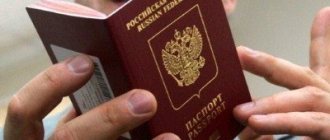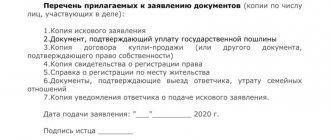Is it possible to check out of an apartment to nowhere?
If there is a need to check out of your home, it is not at all necessary to register again immediately. Domestic legislation provides for several cases when the extract is not accompanied by the provision of information about the new place of registration:
- Sale of an apartment (house) with investment in housing construction, which is at the initial stage. Since the ownership of the new property cannot yet be formalized at this stage, therefore, there is no opportunity to register.
- Sale or donation of housing by the owner, for whom the persons registered in it are not blood relatives.
- Transfer of real estate by inheritance.
- Traveling abroad for permanent residence.
- Alienation of housing that is pledged in the event of non-payment of debt.
How to discharge from a privatized apartment
Privatized housing is housing that does not belong to the state and is the private property of a citizen. As an owner, the owner of a privatized apartment has the right to eject a non-owner from there without his consent.
However, we must not forget about property rights. For example, if a woman wants to write out her ex-husband, but the former spouses once purchased the housing itself under a mortgage agreement, then the matter will become more complicated. The unpaid mortgage debt is considered a common obligation of the former spouses, and they will also have common rights to housing.
To remove a tenant from registration, you must be the full owner of the property and have an extract from the Unified State Register of Real Estate or other papers that confirm ownership: deed of gift, purchase and sale agreement, certificate of inheritance or privatization. You will also need to legally sever family ties with the evicted person and obtain a certificate of divorce.
According to Article 292 of the Civil Code of the Russian Federation, family members of the owner have the right to live with him. However, if the residential premises were privatized after marriage, then it will be considered jointly acquired property, and the evicted person will be able to claim a share.
Here is a general list of cases when a tenant can be discharged from an apartment without his consent:
- Severance of family ties (divorce), except in cases like those mentioned above.
- Long absence from the place of registration. Since eviction from a privatized apartment also usually takes place in court, the owner, after filing a lawsuit, will have to prove that the person does not live in his apartment.
- Acquiring housing as a result of purchase or inheritance. In this case, the applicant is not required to report to the court the reasons for his decision. He only needs to report that the residents refuse to leave the living space voluntarily after the housing is transferred to the new owner.
- Disturbance of public peace. In addition to the owner, the initiators of forced deportation in this case are often neighbors.
- Use of housing for purposes other than its intended purpose.
- Illegal redevelopment, destruction of load-bearing structures and deliberate deterioration of living conditions.
How to check out of an apartment going nowhere?
If termination of registration occurs voluntarily, as a rule, problems with registration do not arise. Confirmation in any form of the presence of a new place of registration is not required, so it is quite possible to deregister to nowhere.
Advice: extracting does not always require personal presence. You can deregister from the State Services portal or entrust the application to the competent authorities to another person. You just need to first coordinate this with the authorized bodies and issue a notarized power of attorney.
There are some features of an extract without registration, depending on the type of premises, or more precisely, the form of ownership of it.
Privatized housing
To check out of a premises owned by a private person, you must contact a special authorized body (passport office) and fill out an application form 6. The form is provided by the employees of the institution; you just need to correctly enter the information into it: full name of the person being checked out and the owner of the living space, education, marital status, old and new place of registration. At the same time, practice shows that any address can be indicated as a future address, since the accuracy of this information will not be checked. A more complex procedure for the discharge of children and persons serving a sentence of imprisonment if they are home owners.
See also: How can Russians move to Finland and obtain citizenship?
Municipal apartment
Voluntarily leaving housing that is state or municipal property is no more difficult than leaving private property, and in some cases it is even easier. For example, if it is necessary to deregister a child, permission from the guardianship authorities will not be required.
Important: persons living under a social tenancy agreement in premises owned by the municipality can be forced out of it only by a court decision if they do not actually live at the appropriate address and do not make payments for utilities, disturb public peace or use the living space not on purpose. To remove such violators from registration, an application is submitted to the municipality followed by filing a lawsuit in court.
Is it possible to deregister the owner of an apartment without his consent?
The Constitution of the Russian Federation protects human rights to the inviolability of property, including housing.
Most lawyers, when asked: “can I be evicted from the apartment without my consent,” will answer: “No” - if we are talking about private property. When municipal housing is considered, forced eviction is quite real and practiced. However, with a competent approach to the issue and building a strong evidence base and arguments, you can achieve the forced eviction of the owner through the court.
Having a problem? Call a lawyer:
Moscow and Moscow region (toll-free call) St. Petersburg and Leningrad region
Reasons
To register and deregister any citizen, it is necessary to be guided by Government Resolution No. 713, adopted by the department in 1995 on July 17. As of today, it has been updated with adjustments dated May 25, 2017, and this is the edition that must be used.
Resolution 713 uses the concepts of “registration” and “deregistration” - both terms are synonymous with the Soviet “registration” and “extract”. The concept of “right to use housing” also appeared in the legislative text.
Registration means the emergence of the right to use this object - the registered person has the right to live in it, and no one can prohibit him from doing so. Deregistration means termination (or loss) of the right to use housing.
You need to know these terms to draw up a competent lawsuit and speech at the meeting.
So, who can start the process of evicting a tenant from an apartment - only the owners, i.e., holders of not only the right of use, but also the rights of ownership and disposal.
The owner of the object is indicated in the Unified State Register of Real Estate, which is maintained by Rosreestr. If the apartment is not registered in Rosreestr, then its actual owner will not be able to carry out any operations with this housing, including registering another owner.
Previously, in order to register property rights, it was necessary to register an object in the State Property Committee (State Cadastre), now these procedures are carried out simultaneously, and it is easier for the population to register property rights.
Grounds for cancellation of registration:
- Actual residence at a different address - it is important how often the person appears in the apartment in question;
- No obstacles from the owner;
- Lack of registered property and personal belongings in the apartment;
- Does the person pay his share of housing and utility bills;
- Degree of relationship with other residents;
- If the apartment is in shared ownership, do the other owners want this person to be registered?
- Human behavior:
- use of the apartment for other purposes;
- causing inconvenience to neighbors;
- actions that threaten the life and health of others, etc.;
causing damage to the apartment, as well as the entire house;
In reality, any circumstances matter, due to which there was a need to register the owner - you should not neglect even the little things.
Where to contact?
Only a court can deregister the owner without his consent; by its decision, the authorized bodies will remove the person from the registration register.
Such cases are dealt with by district courts, not magistrates' courts. The procedure for forced deregistration is provided for in the legislation for situations where the registration stamp in the passport was obtained illegally (by concealing information from the owner), when the registered person interferes with the exercise of the rights of other residents, for example, interferes with the privatization procedure, or by his behavior causes harm to the residential property.
In addition to the court, you can try to discharge a person through the housing and communal services service or the HOA - if one of the owners does not pay utility bills, you need to submit an application to split the receipts. If large debts arise, the housing and communal organization has the authority to file a lawsuit to evict the person. Administrative bodies and the prosecutor's office can act as plaintiffs.
Also an important body in the case is the district or city housing authority - for example, the Housing Department, as in the capital. Each municipality has its own name for this body.
After the court decision on termination of the right of use has entered into force, you need to contact the passport office - today its functions are assigned to the Main Directorate for Migration Issues of the Ministry of Internal Affairs of Russia and its territorial branches, or to any MFC. Through one of these bodies, the actual deregistration of the owner will be carried out and the corresponding certificate will be issued.
Documentation
The main document with the help of which an extract from a privatized apartment can be effected is a well-drafted claim.
As already noted, the owner of the property, and in some cases, the housing and communal services service, can file a claim.
Thus, it turns out that it is really possible to deregister a person only in the case of shared ownership. If the owner is the sole owner, and family members or other registered people want to sign him out, there is practically no chance of winning the case.
The claim is filed in the district court. Since this issue is not of a property nature, the court fee is fixed - 200 rubles per claim. If there are several petitions in the claim, then you need to pay for each.
Only a court can expel the owner without his consent.
When evicting an owner or a registered person, it is important to correctly formulate the requirement. For example, if the reason for the claim is a negative impact on the emotional state of children and former family members after the termination of family relationships, you need to attach a copy of:
- divorce certificates,
- court order on deprivation of parental rights,
- certificate from a drug treatment clinic.
If the reason is evasion of payment of housing and utility bills, an extract for the entire period is attached, which shows that other co-owners of the property paid for the owner.
It is extremely important for the court to prove attempts to resolve the issue pre-trial. For example, the plaintiff offered the defendant to check out on his own, but was refused or ignored. To prove this action, the offer must be made in writing. If the defendant refuses to sign for receipt of such an offer, then you need to send him a registered letter - preferably with a notarized envelope.
Also good evidence is an offer to buy out the defendant's share. After refusal or lack of response within 30 days, you can file a lawsuit. If there are other persons in the right of ownership besides the plaintiff and defendant, their written consent to evict the defendant with notarization is required.
It is important to know that if the defendant has other residential property, the chances of winning the case increase. If this is the only living space, then the court is unlikely to evict him.
In this case, the more or less suitable option is to file a claim for the allocation of natural shares. However, this method is only suitable for housing with more than one room. The court will allocate one room to one owner, another to another, and each has no right to enter the other’s territory without permission. Only common rooms remain common - a kitchen, a bathroom, a corridor, which are divided into proportional shares.
How to register a registered person - procedure
How to proceed to register the owner:
- Send him a written proposal to deregister voluntarily - you can add an offer to buy out his share in the property. If you are sending a purchase offer, indicate a price that should not be less than the market price for similar housing;
- Wait 30 days for the owner's response. In the absence of a response or refusal to collect evidence, file a statement of claim;
- File a claim in court and wait for the claim to be considered;
- If approved, prepare for the hearing.
- State your demands at the meeting - perhaps attract witnesses, specialists, experts;
- If an affirmative decision is made on the claim, submit an application together with it to the passport office to remove the person from the registration register;
- If, after receiving the discharge certificate, the defendant refuses to leave the apartment, then go to court again to initiate enforcement proceedings;
- Wait for the execution of a court decision by bailiffs - the actual forced eviction of a person.
If you have doubts about your ability to go through all these stages on your own, it is better to contact a qualified lawyer. Information on how much it costs to discharge a person from an apartment through the court is in this article.
Required package of documents
When contacting the authorized bodies in order to be discharged, you must present your passport and attach the following documents to the application:
- Paper on the right to the premises (certificate of ownership).
- A certificate about who is registered in the living space (extract from the house register).
- Departure sheet.
If you are registering a minor, you must submit the following:
- Statement from parents or other legal representatives.
- Permission from the board of trustees (not required in all cases).
- Birth certificate of a minor.
- Parents' passports.
Important: when contacting the passport office to check out, you must present your passport. No other identification document will be accepted in this case.
Is it possible to discharge a minor to nowhere?
Discharge of a person under 18 years of age without subsequent registration is practically impossible. As a general rule, when discharging a child from a privatized apartment, it is necessary to obtain permission from the guardianship authorities, who will give it only if they confirm that the minor will be provided with proper living conditions. The board of trustees can be convinced of this by documents for purchased completed housing or a permit for permanent residence abroad if there is living space in the relevant country. You can challenge the decision of the guardianship authorities in court, but the verdict is unlikely to be positive. The court is primarily guided by the interests of the child. It will be possible to remove him from registration only if the minor’s living conditions do not worsen and the deregistration is carried out jointly with his parents or other legal representatives. If there is no child’s share in a privatized apartment, you don’t have to take the appropriate permission from the guardianship authorities.
See also: Emigration from Russia to the USA - answers to all questions
Deregistration of a child is permitted in the event of the sale of an apartment (house), if he does not live in the housing in which he is registered, in the event of deprivation of parental rights, as well as when registering in the apartment a person with whom the minor is not related by blood, provided that that the child lives with his parents.
Theoretically, it is possible to create a situation where a child is discharged into nowhere, for example, when selling a home without buying a new one, but in this case, the account opened in the name of the minor should contain an amount equivalent to his part of the apartment (house).
What should I do if the owner wants to check me out of the apartment without my consent?
Upon receipt of a notice of deregistration, you should:
- study its contents;
- contact a lawyer for advice;
- collect documents confirming the impossibility of registering at another address;
- file a claim with a judicial authority.
It makes sense to carry out the above actions if there is a possibility of retaining the right to use housing. Otherwise, you need to look for a new place of residence.
Fines and consequences of lack of registration
In accordance with domestic legislation, everyone who lives in Russia must be registered at their place of residence. This applies equally to citizens of the Russian Federation and foreigners. A person who does not have registration may face various restrictions and even be punished. A list of some opportunities that are unavailable or significantly limited when discharged to anywhere:
- Free medical care, insurance policy.
- Assignment of pensions, various types of benefits and social benefits.
- Obtaining an insurance policy, passport and pension certificate.
- Admission of a child to an educational institution.
- Service in banks and government institutions, obtaining loans.
- Official employment.
For some offenses in the field of registration, administrative, and in some cases even criminal, liability is provided. A person who has not completed registration within 3 months after moving to a new place of residence is subject to a fine, the amount of which depends on the locality, as well as on the category of the offender, and can range from two thousand rubles. In Moscow and St. Petersburg it is several times higher than in other cities. Not only those who live in an apartment without registration can be fined, but also its owner, including a legal entity, and the amount of the fine will be much higher. In this way, the legislator is trying to solve the problem with homeowners refusing to register persons living in their living space.
Foreign citizens must register within 7 days after crossing the border, otherwise they will face administrative liability in the form of a fine. If the period of delay is more than 120 days or the deadlines are violated repeatedly, the foreigner may be forcibly expelled from the country with a ban on entry for the next few years.
See also: Registration of a second passport if you have the first one
If it is not possible to obtain permanent registration immediately after discharge, you can make a temporary one, which is valid for six months with subsequent extension. However, it should be remembered that in case of delay, the same liability arises as in the absence of registration.
In some cases, there is no liability for living without registration. We are talking, in particular, about close relatives of the owner of the home. They are allowed to live together with the person who owns the apartment (house), without registration.





